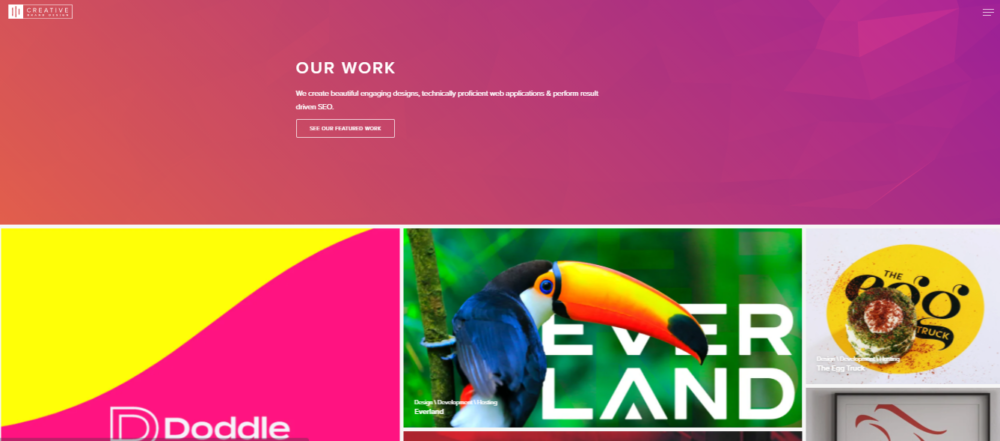If you’re running your own web design business then you should know how important it is to get web design leads. New leads keep your company running. If you can consistently secure new clients, the business will grow.
However, fellow business owners that are just starting out will tell you that it’s not easy to get leads. Fortunately for you, many people have been where you are now.
There are strategies you can apply to your business that have been proven to work. In this article, we’ll discuss ten ways to secure web design leads for your business.
1. Make Time To Prospect Web Design Leads
It’s unlikely that you’ll get people coming to you inquiring about your services, at least not when you’re just starting out. You need to prospect for leads actively. That means identifying companies that might benefit from your service, contacting them, and pitching your offering.
💔 Break up with bad clients: There are better clients waiting for you. And SolidGigs can help you find them. Get a team of gig-hunters and a custom dashboard. Starting at just $31/mo. Learn more »
If you’re a one-person team, set aside an hour every day prospecting leads. The first thing you will need to do is create a customer persona. A customer persona will help you identify what type of business to target.
You’ll then need to create a list of businesses that fit the customer persona.
Next, you need to make connections. For B2B businesses, I recommend LinkedIn. Through LinkedIn, you can connect with people at a company you want to work with. For example, the founder of the company or the Chief Marketing Officer. Then, make your pitch.
A good pitch will:
- Explain why they need your service & what benefits they can expect
- Why they should turn to you to deliver the service. The reason might be that you offer a competitive price, have experience in their niche, etc.
In addition to cold prospecting, you can also use freelance job sites. Check out online directories, too.
If you have a team, make someone responsible for this. That person should also be responsible for monitoring sales metrics, such as the warm leads the agency has, the calls booked, and the deals closed.
The bottom line is, as a web design agency, you shouldn’t just focus on existing customers. You should prioritize getting leads as well.
2. Build a Stunning Website
If your agency still doesn’t have a website, then I suggest you get one built now.
According to KPMG’s Global Online Consumer Report, 47% of consumers visit a brand’s website before making a purchase. This habit cuts across generations.
But don’t be content with having your website up and running. To get people interested, your website should be aesthetically pleasing, not just presentable. Remember, you’re a web design agency. Potential clients will expect nothing less from a company that specializes in design.
The website should also work properly. Your website won’t impress potential clients even if it looks great if it doesn’t load quickly in the first place.
According to Hobo Web, a two-second delay in load time leads to abandonment rates of up to 87%. People don’t return to websites that take longer than four seconds to load.
The website is a reflection of the service you offer. That means your website should look professional and creative so that you can generate those web design leads.

3. Have a Blog
If you’re serious about securing web design leads, I strongly suggest you start blogging. I’m sure you understand the value of a blog to your business.
Here are a couple of reasons to start a blog:
- Position yourself as an expert in your field; you can share your knowledge and experience with prospects through your blog posts.
- Create a personal connection with visitors; each article you write is a chance to express your personality. If you can create a connection with a visitor, you are more likely to make a sale.
- Get inbound leads; blogging is one of the best ways to increase the number of visitors to your site. The more visitors, the more chance of landing leads.
The blog content you create should relate to what you’re doing, of course.
You can write about web design trends, or web design leads. You can talk about the elements of a great web design. Learn how to write blog posts that designers will read.
Optimize your blog posts with keywords anyone interested in web design will search for on Google or any search engine such as “web design agency,” or “web design,” or “web design trends,” too.
Keywords Everywhere is a great tool to search for keywords to write about. You can get the freemium Chrome extension or the Firefox add-on.
If you’re interested in blogging, but don’t know how to begin, read up on how to start a design blog. The article provides plenty of insights you’ll find useful.
4. Create an Online Portfolio
When potential web design leads consider working with you, they will want to know if you can deliver the service you promise. Through your portfolio, you can show clients examples of previous work.
A good portfolio provides the proof you need to back up the claims you make in a sales call. Moreover, web design leads you don’t know exist will likely review your portfolio before they make contact.
Create a section of your site specifically for your portfolio.
When sharing examples of your work, make sure to discuss the client’s briefs, and how you delivered on those results. In most instances, discuss how you created a website that not only looked great but also helped the company grow.
Creative Brand Design agency based in London is a nice example. Each case study in their portfolio comes with some web copy that provides context for the project. As a reader you learn about the design brief, and what the agency delivered for that particular project.

The point is this; If you present case studies, include statistics and the time your agency spent working on the website. You want to provide information to persuade them to make contact.
5. Include Your Contact Number & Email Address
Share your contact number and email address prominently on your website. According to LeadGenApp, the best place to put those are in the website header. That makes sense. People who use the Roman alphabet typically read from top to bottom.
When visitors come to your site, your contact details will be one of the first things they will see.
Just a small reminder: Don’t include a personal cell phone number or your personal email address. Use your office’s phone number and professional email address. Don’t use an email address like [email protected].
6. Make Contact Forms Simple
In addition to a phone number or email address, share a web form. Web forms provide a structured format for funneling inquiries.
The webform should be user-friendly. In other words, don’t make it hard for interested leads to contact you. Don’t ask for unnecessary details. Make it precise and easy-to-use.
Here’s a great example from Flickerbox based in San Francisco:
The contact form is easy to fill out.
There are only three fields, as opposed to at least six fields I’ve seen in the contact forms of other web design companies. All the interested web design leads would have to do is type a few words and then submit.
If you want to gather additional information, you can always send the web design leads to a thank you page with a link to a short questionnaire. That way, you collect their contact details straight away and can gain additional information after you gained their details.
7. Use Social Proof
Most businesses are risk-averse. People want to be assured that when they shell out some money, they’ll get what was promised. A good way to reassure them that you’ll deliver is to provide social proof on your website.
Include testimonials of happy former clients prominently on sales pages and alongside case studies. Social proof provides web design leads assurance that your visitors are not guinea pigs.
Gathering testimonials is as easy as asking your former clients for feedback.
At the end of a project, send clients a thank you email, for example, and then ask them politely to answer some questions about your work.
The questions should help you get critical feedback about your work so you can improve your service. In addition to these questions, ask for feedback in the form of a testimonial that you can share publicly.
A final tip, but also very important: Never makeup customer testimonials. Apart from the fact, this is highly unethical, if people discover you tricked them you will lose your credibility and web design leads.
8. A/B Test
You want to make sure all the elements in your website optimize conversions. For example, does the call-to-action “Submit” in your contact form drive more conversions than “Contact Us”?
There are many elements on the website you can A/B test.
For example, you can check whether a particular headline works better than the other, or if it would be best to remove the navigation bar. Changing the placement of customer testimonials can also make a difference.
Small changes in elements like headings, CTA button colors, font style, title tags, and showcasing current clients can make a huge difference.
A/B tests provide you with statistical data to ensure the assumptions that you are acting on are correct. As an agency owner, you must save a slot in your work schedule to experiment with various elements of your website.
9. Expand Your Network
To get web design leads, you need to meet people. You can do this online using social networks like LinkedIn, something I discussed earlier. You should also engage with relevant communities online and offline.
Use sites like Meetup.com to search for web design events in your area and attend those. Or look for those events in Facebook groups that cater to web designers. You can search for these just by using the search function.
When attending the events, make sure you talk and mingle with people. Give out calling cards or exchange contact information. The idea is to know as many people as you can so they can either hire your agency once a project crops up, or they can refer you to other web design leads they might have.
You don’t have to attend the events only physically, though. Nowadays, online events have become the norm. Maybe there’s a webinar organized by a company that can be a potential client, too.
Or you can join relevant online communities. According to 1stwebdesigner, here are ten helpful ones for web designers:
- Coffeecup forums
- Killersites community
- Sitepoint forums
- Designer News
- Devshed
- Designer Hangout
- Web Designer Forum
- DigitalPoint
When networking, don’t forget to follow up after attending the events, too. Networking involves nurturing the relationships you built. Don’t just contact people when you need something.
10. Specialize In a Niche
Web design is a very competitive industry. I’m sure you already know this.
There are many web design companies out there, and that makes it difficult for small agencies to compete. The key then is to look for something that will make your company stand out.
Specializing or niching down can help you stand out. Instead of packaging yourself as just a web design company, you could provide a service for real estate companies, for example.
Choose a niche you and your team are comfortable with.
While you might miss out on some opportunities by specializing in a sector, you’ll end up getting more web design leads overall. It’s a trade-off, but you’ll find a lot of companies are happy to make this trade-off because it makes finding and securing web design leads easier.
How to Turn Web Design Leads to Clients
Not all web design leads that approach you will become your clients. However, you can improve your conversion rate from prospect to sale by implementing clear processes to funnel inquiries.
First, gather information about the prospect. You can ask them to complete a short questionnaire before your meeting. Ask questions that help you understand their goals, how they will measure success, and what is their budget for the project.
When you have a sales meeting, make sure your pitch aligns with their goals. Discuss how the work you will do will help them get more clients, make more money, or whatever it is they hope to achieve.
When you have agreed on the deliverables, create a project proposal. Then, get on a call with the lead and discuss the project proposal. A sales funnel like this is designed to turn the maximum number of prospects into clients.
Conclusion
Lead generation is crucial to the survival of any business, including web design companies. That means you and your team should not just focus on doing a great job when given a project. You should focus on getting web design leads, too.
I’ve outlined the strategies you should use to do this in this guide. Now it’s over to you. Just remember that these are not one-time strategies you should implement.
Implement these consistently, and follow the instructions I gave to convert them into clients. Nurture relationships with your clients by sending client gifts, or cards, once in a while. If executed well, you’ll see your agency won’t be out of projects any time soon.
Keep the conversation going...
Over 10,000 of us are having daily conversations over in our free Facebook group and we'd love to see you there. Join us!





